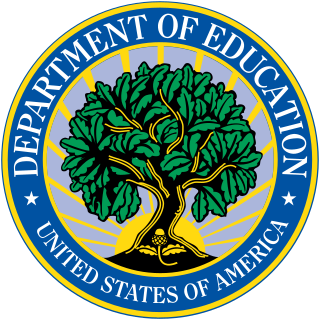
The United States Department of Education is a Cabinet-level department of the United States government. It began operating on May 4, 1980, having been created after the Department of Health, Education, and Welfare was split into the Department of Education and the Department of Health and Human Services by the Department of Education Organization Act, which President Jimmy Carter signed into law on October 17, 1979.
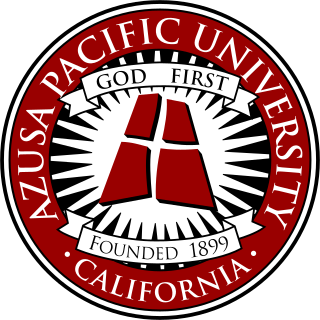
Azusa Pacific University (APU) is a private, evangelical Christian university in Azusa, California. The university was founded in 1899, with classes opening on March 3, 1900, in Whittier, California, and began offering degrees in 1939. The university's seminary, the Graduate School of Theology, holds to a Wesleyan-Arminian doctrinal theology. APU offers more than 100 associate, bachelor's, master's, and doctoral programs on campus, online, and at seven regional locations across Southern California.
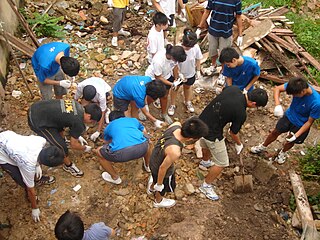
Service-learning is an educational approach that combines learning objectives with community service in order to provide a pragmatic, progressive learning experience while meeting societal needs.
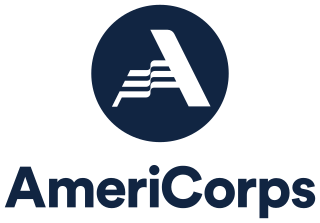
National Civilian Community Corps (NCCC), or AmeriCorps NCCC is an AmeriCorps program that engages 18- to 24-year-olds in team-based national and community service in the United States. Under the CARES act, however, the maximum age of entry is 26. National Civilian Community Corps teams complete about four different six- to eight-week-long projects during their 10-month term of service. Each team is made up of eight to twelve Corps Members and one Team Leader. Corps Members and Team Leaders are representative of all colors, creeds, states, and economic status. Approximately 1,200 Corps Members and Team Leaders are chosen annually to serve at one of four regional campuses, located in Sacramento, California; Denver, Colorado; Vinton, Iowa; and Vicksburg, Mississippi. Each campus serves as a training center and hub for a multi-state region. Members are required to complete a minimum of 1,700 hours of service, including 80 independent service hours, though members complete an average of 1,850 service hours per term.

The Carnegie Corporation of New York is a philanthropic fund established by Andrew Carnegie in 1911 to support education programs across the United States, and later the world. Carnegie Corporation has endowed or otherwise helped to establish institutions that include the United States National Research Council, what was then the Russian Research Center at Harvard University, the Carnegie libraries and the Children's Television Workshop. It also for many years generously funded Carnegie's other philanthropic organizations, the Carnegie Endowment for International Peace (CEIP), the Carnegie Foundation for the Advancement of Teaching (CFAT), and the Carnegie Institution for Science (CIS). According to the OECD, Carnegie Corporation of New York’s financing for 2019 development increased by 27% to US$24 million.

The Public Broadcasting Act of 1967 issued the congressional corporate charter for the Corporation for Public Broadcasting (CPB), a private nonprofit corporation funded by taxpayers to disburse grants to public broadcasters in the United States, and eventually established the Public Broadcasting Service (PBS) and National Public Radio (NPR).

AmeriCorps is an independent agency of the United States government that engages more than five million Americans in service through AmeriCorps VISTA, AmeriCorps NCCC, AmeriCorps State and National, AmeriCorps Seniors, the Volunteer Generation Fund, and other national service initiatives. The agency's mission is “to improve lives, strengthen communities, and foster civic engagement through service and volunteering.” While a government agency, AmeriCorps acts much like a foundation and is the nation's largest annual grant maker supporting service and volunteering. It was created by the National and Community Service Trust Act of 1993. In September 2020, the agency rebranded itself as AmeriCorps, although its official name is unchanged.

American University of Nigeria The American University of Nigeria (AUN) is a private university in Yola, Nigeria. It offers an American-style liberal arts higher education at undergraduate, graduate, and professional levels. Founded in 2003,[1] AUN, Africa’s first “Development University,” is accredited by the National Universities Commission (NUC).[2] Its current faculty numbers 93, its undergraduate and graduate enrollment is 1500 students. as the first American-style university in Sub-Saharan Africa. AUN is accredited by the National Universities Commission (NUC).
The American Council on Education (ACE) is a nonprofit 501(c)(3) U.S. higher education association established in 1918. ACE's members are the leaders of approximately 1,700 accredited, degree-granting colleges and universities and higher education-related associations, organizations, and corporations. The organization, located in Washington, DC, conducts public policy advocacy, research, and other initiatives related to key higher education issues and offers leadership development programs to its members and others in the higher education community.
University of the Rockies was a private university in Denver, Colorado. It operated from 1998 to 2018 and offered graduate and postgraduate instruction in the social and behavioral sciences both online and at its Denver Instructional Site. The university's programs were organized into two schools: The School of Professional Psychology (SOPP) and the School of Organizational Leadership (SOL), offering masters and doctorate degrees as well as graduate level certificate programs. The university's parent organization, Zovio, is a for-profit higher education company based in San Diego, California.

Student governments in the United States exist in both secondary and higher education. At the collegiate level, the most common name is Student Government, according to the American Student Government Association's database of all student governments throughout the United States. The next most common name is the student government association. Other names are student senate, associated students, or less commonly students' union. There is one instance of a government of the student body, at Iowa State University. At Yale University, the undergraduate student government is known as the Yale College Council. High school student governments usually are known as Student Council.
The America Creating Opportunities to Meaningfully Promote Excellence in Technology, Education, and Science Act of 2007 or America COMPETES Act was authored by Bart Gordon and signed by President George W. Bush; it became law on 9 August 2007. This was an Act, "To invest in innovation through research and development, and to improve the competitiveness of the United States."

Southwestern Indian Polytechnic Institute (SIPI) is a public tribal land-grant community college in unincorporated Bernalillo County, New Mexico, with an Albuquerque postal address. It is federally operated by the Bureau of Indian Affairs and funded through the Bureau of Indian Education, both agencies within the United States Department of the Interior. More than 120 different Indian Tribes are represented in SIPI's student body.
The 21st Century Community Learning Centers initiative is the only federal funding source dedicated exclusively to afterschool programs. The No Child Left Behind Act (NCLB) reauthorized 21st CCLC in 2002, transferring the administration of the grants from the U.S. Department of Education to the state education agencies. Each state receives funds based on its share of Title I funding for low-income students. Funds are also allotted to outlying areas and the Bureau of Indian Affairs.The No Child Left Behind Act narrowed the focus of 21st CCLC from a community learning center model, where all members of the community benefited from access to school resources such as teachers, computer labs, gymnasiums and classrooms, to an afterschool program model that provides services only to students attending high-poverty, low-performing schools. The services they provide include Academic enrichment activities that can help students meet state and local achievement standards. They also provide additional services designed to reinforce and complement the regular academic program, such as: drug and violence prevention programs, counseling programs, art, music, and recreation programs, technology education programs, and character education programs. Programs also may provide literacy and related educational development services to the families of children who are served in the program.
The Kentucky Council on Postsecondary Education coordinates change and improvement in Kentucky's postsecondary education system as directed by the Kentucky Postsecondary Education Improvement Act of 1997. The Council is a statewide coordinating agency with sixteen members: fourteen citizens, one faculty member and one student appointed by the Governor; the Commissioner of Education is an ex officio member.

The Edward M. Kennedy Serve America Act or Serve America Act was introduced in the United States House of Representatives on March 9, 2009, by Representative Carolyn McCarthy of New York. Originally titled the Generations Invigorating Volunteerism and Education Act, the bill reauthorizes and expands the AmeriCorps program that was first established in 1993. It passed in the House of Representatives on March 18, 2009. The U.S. Senate debated and approved an amended version of the bill on March 26, 2009, renaming it the Edward M. Kennedy Serve America Act, after Senator Ted Kennedy. The House of Representatives voted on the bill a second time, approving the amended version on March 31, 2009. It was signed by President Barack Obama on April 21, 2009.
There are numerous elementary, secondary, and higher institutions of learning in the Commonwealth of Pennsylvania, which is home to 500 public school districts, thousands of private schools, many publicly funded colleges and universities, and over 100 private institutions of higher education.

AmeriCorps VISTA is a national service program designed to alleviate poverty. President John F. Kennedy originated the idea for VISTA, which was founded as Volunteers in Service to America in 1965, and incorporated into the AmeriCorps network of programs in 1993. VISTA is an acronym for Volunteers in Service to America.
The Office of Social Innovation and Civic Participation was an office new to the Obama Administration, created within the White House, to catalyze new and innovative ways of encouraging government to do business differently. Its first director was the economist Sonal Shah. The final director was David Wilkinson.
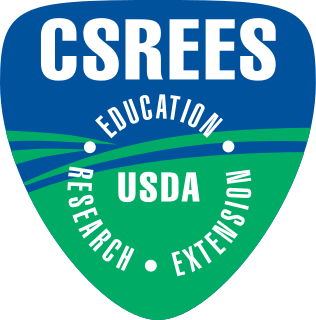
The Cooperative State Research, Education, and Extension Service (CSREES) was an extension agency within the U.S. Department of Agriculture (USDA), part of the executive branch of the federal government. The 1994 Department Reorganization Act, passed by Congress, created CSREES by combining the former Cooperative State Research Service and the Extension Service into a single agency.










